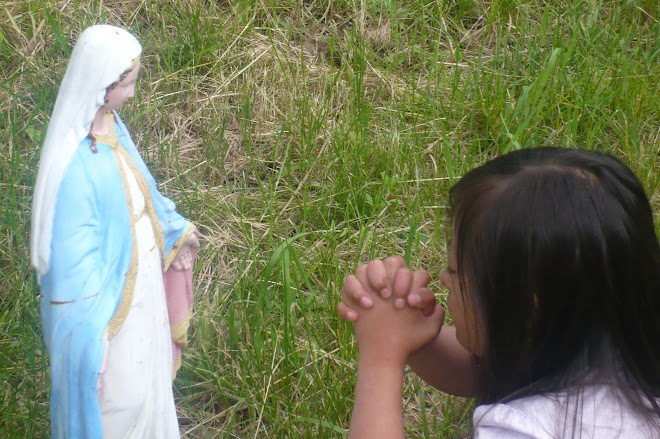At Mass this morning, the priest reminded us that we were celebrating thanksgiving, which in Greek is eucharist. In fact the first Thanksgiving, if you are a Catholic took place at St Augustine at the Mision de Nombre de Dios, a tiny Spanish chapel still in existence. There, Spanish missionaries offered the very first Eucharist in America.
So, to my readers, I offer my wish for a heart full of gratitude for the blessings of living in the grace of God, in freedom, and in relative peace.
Thank God for my family, my health, my husband's job which supports us, my writing by which I try to give my talent to Him as an offering. Thank God for my three wonderful girls, who just earned honors by their hard work in Catholic schools, and for their good Catholic friends. I thank God for Fr Tito, my holy pastor, and for the schedule which allows me to attend daily Mass, and for the Friary of Our Lady of Guadalupe where I can refresh my soul in front of the Blessed Sacrament 24 hours a day. I thank God for good pro-life friends who are working to promote a Culture of Life both online and in my community. I thank God for my father, who is learning to live without my mother, step by painful step. I thank God for my mother's happy death, and entrust her to the mercy of God.
I thank God that America seems to be waking up to the evils of the most pro-abortion politician on earth, Barack Obama, and for the Manhattan Declaration by which Christians are uniting to resist the Culture of Death. I thank God for courages prelates like Pope Benedict, and Bishop Tobin who are not afraid to call evil evil, and pay the consequences. I thank God for holy priests, for the Holy Rosary, Eucharistic Adoration, and for the Latin Mass
I thank God that our freedom of speech and freedom of religion are still protected in America, and pledge my full efforts to preserve both.
I thank God that Christ is King of heaven and earth, and that the entire universe is in His Hands. I know that all this turmoil in the present day will pale in comparison to the glory that awaits us in Heaven. I thank God for the gift of His Mother, who holds back His Hand of judgement on us until more sinners can repent.
Amen

So, to my readers, I offer my wish for a heart full of gratitude for the blessings of living in the grace of God, in freedom, and in relative peace.
Thank God for my family, my health, my husband's job which supports us, my writing by which I try to give my talent to Him as an offering. Thank God for my three wonderful girls, who just earned honors by their hard work in Catholic schools, and for their good Catholic friends. I thank God for Fr Tito, my holy pastor, and for the schedule which allows me to attend daily Mass, and for the Friary of Our Lady of Guadalupe where I can refresh my soul in front of the Blessed Sacrament 24 hours a day. I thank God for good pro-life friends who are working to promote a Culture of Life both online and in my community. I thank God for my father, who is learning to live without my mother, step by painful step. I thank God for my mother's happy death, and entrust her to the mercy of God.
I thank God that America seems to be waking up to the evils of the most pro-abortion politician on earth, Barack Obama, and for the Manhattan Declaration by which Christians are uniting to resist the Culture of Death. I thank God for courages prelates like Pope Benedict, and Bishop Tobin who are not afraid to call evil evil, and pay the consequences. I thank God for holy priests, for the Holy Rosary, Eucharistic Adoration, and for the Latin Mass
I thank God that our freedom of speech and freedom of religion are still protected in America, and pledge my full efforts to preserve both.
I thank God that Christ is King of heaven and earth, and that the entire universe is in His Hands. I know that all this turmoil in the present day will pale in comparison to the glory that awaits us in Heaven. I thank God for the gift of His Mother, who holds back His Hand of judgement on us until more sinners can repent.
Amen


